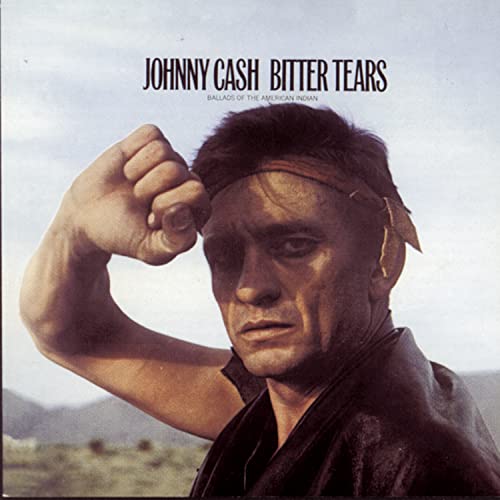Walk the Line
 My wife and I finally saw that Cash movie last night.
My wife and I finally saw that Cash movie last night.When we walked out at the end, I told her, "If you didn't already know who Johnny Cash was, you still wouldn't know at the end of this film."
Nearly everyone has pointed out that the film downplays Cash's Christianity, and it does, but something else deeply important for Cash is totally ignored.
His Cherokee heritage.
In 1964, Cash produced the album Bitter Tears: Ballads Of The American Indian and spoke out for the Indians, perhaps to ensure that they weren't ignored in a time of the movement for civil rights. The authenticity of his conviction comes through in the album, which you'd have to listen to rather than hear me describe it, but here's what Cash says in one of his autobiographies:
"Bitter Tears, in which I was inspired by the Native American songwriter Peter LaFarge, was an intense research project. I dove into primary and secondary sources, immersing myself in the tragic stories of the Cherokee and the Apache, among others, until I was almost as raw as Peter. By the time I actually recorded the album I carried a heavy load of sadness and outrage; I felt every word of these songs, particularly 'Apache Tears' and 'The Ballad of Ira Hayes.' I meant every word, too. I was long past the point of pulling my punches."I don't have either of Cash's two autobiographies (Man in Black [1975]; Cash: The Autobiography [1998]), so I don't know which of the two was being cited, for this quote comes from Johnny Heering's review of the album at Amazon.com, and it doesn't specify, but if you read the album's liner notes, penned by Los Angeles DJ Hugh Cherry, you get the same sense for what Cash felt.
But even if this part of Cash had been included, and also more about his Christianity, you still wouldn't know who he was. I've listened to his music since I heard it on the radio as a small kid, and I don't know.
But he's fascinating, for me. For my wife, too, whose first words after the film were: "I want to learn the lyrics to all of his songs." She especially liked the prison ones, which just goes to show that Waylon Jennings was right: "ladies love outlaws."
Good thing I'm a little bit outlaw myself...


3 Comments:
My favorite is his recording of "Wanted Man" he made live at San Quentin. That and his cover of "Hurt" by Nine Inch Nails. The guy was amazing.
So what's your outlaw story? I hope you're going to elaborate.
Jessica, I'll only hint at my outlaw status, for a bit of mystery is best in these obscure realms of the soul.
But here's a sample, the truly perfect country-and-western song: Day Breakin'.
Jeffery Hodges
* * *
GI Korea, the movie was (for me) a good film with some moments of greatness and a lot of excellent acting. Not many Koreans were present, there seems to be little interest in this country, and I doubt that anyone who doesn't already love Johnny Cash would understand what the fuss is all about.
Fortunately, there are a helluva lot of folks who DO love Johnny Cash (myself included) -- and not only in America.
He was hugely popular in Germany, for example. The loved him there, and he used to tell the Germans, "Deutschland ist meine zweite Heimat" (Germany is my second homeland).
I even have a copy of Cash singing "How High is the Water, Mama" in German: "Wo ist zu Hause, Mama" (Where is the House, Mama?).
I played it for a German friend, who listened and remarked, "Ja. Na ja" (Yeah, so what?).
"Did you understand it?" I checked.
"No, the English was too hard," she replied.
When I told her it was in German, she couldn't believe it until she had listened again, and she then loved it.
Jeffery Hodges
* * *
Post a Comment
<< Home